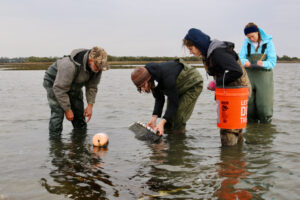
For many coastal communities, bivalve aquaculture can boost the economy, help revitalize working waterfronts, and provide a more resilient coastal landscape. The NCCOS Cooperative Oxford Laboratory (COL) provides predictive models, datasets, maps, tools, and targeted research to define and inform sustainable shellfish aquaculture development along US coastlines.
Research efforts at COL vary among understanding the environmental interactions of shellfish cultivation, predicting nitrogen removal, developing siting tools, and quantifying and valuing ecosystem services of shellfish aquaculture at a municipal level.
Four separate NCCOS projects on oyster related coastal aquaculture siting and sustainability are presented in this story map, providing an engaging overview of this important NCCOS body of work. This tool can be used to inform managers and the public on oyster related ecosystem services and the environmental interactions of shellfish cultivation, predicting nitrogen removal by the eastern oyster aquaculture industry, developing a siting tool for sustainable oyster aquaculture in Texas, and quantifying and valuing municipal scale shellfish ecosystem services in Greenwich, Connecticut.
Successful coastal aquaculture efforts can enhance coastal resiliency, provide economic benefit to rural areas by creating jobs, and support the production of sustainable domestic seafood to help reduce the $16 billion seafood trade deficit in the US.
